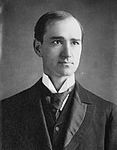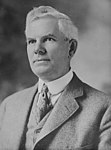 | |||||||||||||||||||||||||||||||||||||||||||||||
| |||||||||||||||||||||||||||||||||||||||||||||||
Needed to win: Majority of votes cast First ballot: 420 votes cast, 211 needed for a majority Ninth ballot: 414 votes cast, 208 needed for a majority | |||||||||||||||||||||||||||||||||||||||||||||||
|---|---|---|---|---|---|---|---|---|---|---|---|---|---|---|---|---|---|---|---|---|---|---|---|---|---|---|---|---|---|---|---|---|---|---|---|---|---|---|---|---|---|---|---|---|---|---|---|
| |||||||||||||||||||||||||||||||||||||||||||||||
| |||||||||||||||||||||||||||||||||||||||||||||||
At the opening of the 68th United States Congress, the members-elect of the House of Representatives held an election for Speaker of the House on December 3–5, 1923. Republican Frederick H. Gillett received a majority of the votes cast in the 9th ballot and was re-elected speaker. This was the first multiple ballot speaker election since 1859–60, and the last until January 2023.
Progressive Republicans, primarily those from the states of Minnesota and Wisconsin, refused to support Speaker Gillett for the first eight ballots. After winning concessions from Republican conference leaders (a seat on the House Rules Committee and a pledge that requested House rules changes would be considered), progressives agreed to support Gillett.[1]
- ^ Wolfensberger, Don (December 12, 2018). "Opening day of new Congress: Not always total joy". The Hill. Retrieved February 20, 2019.



